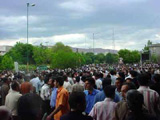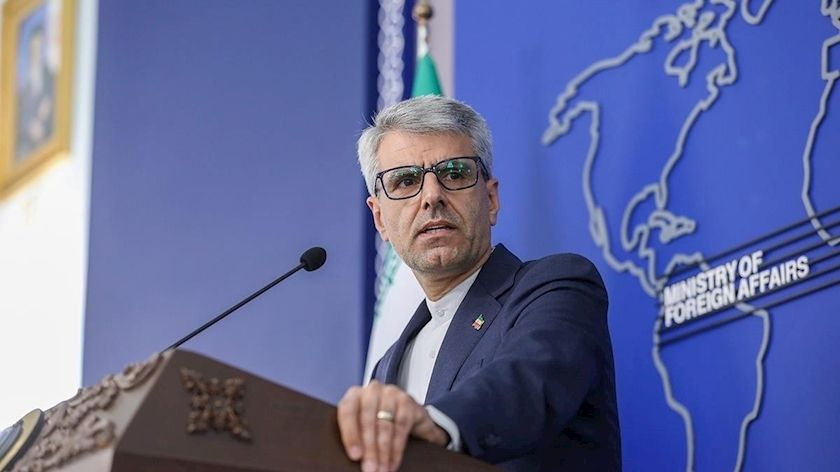|
|
TODAY.AZ / Politics
Ethnic Azeri predicts more protests in Iran
01 August 2006 [00:11] - TODAY.AZ

On July 31, the United Nations Security Council adopted a resolution mandating that Tehran suspend uranium enrichment by August 31, or face sanctions. Iranian officials claim the country's nuclear program is designed to meet civilian energy needs. US and European leaders, meanwhile, insist that Iran is striving to develop nuclear weapons. Iranian diplomats immediately rejected the Security Council resolution.
While the United States has long pressed for UN Security Council action to thwart Iran's suspected atomic ambitions, in recent months American policymakers have looked for other means to slow, if not halt Iran's nuclear research. Accordingly, mounting interethnic tension in Iran has intrigued some in Washington.
Unrest among Iranian Azeris began in late May, when protests over an official newspaper's caricature of Azerbaijan as a cockroach led to the deaths of 24 people and the arrests of hundreds of activists demanding an expansion of Azeri cultural rights.
On June 30, an attempt to hold rally at Bazz (Babek) Castle in northwestern Iran to commemorate the birthday of the Azeri national hero, Babek, who organized resistance against Arab invaders in the 9th century, prompted a new wave of arrests in a number of Iranian cities.
On the eve of the march, Amnesty International issued a special report which urged the Iranian government to allow the rally participants to assemble freely, and demanded the release of event organizers who had been arrested earlier. The same was demanded by 19 European parliament members on July 22 who urged the Iranian government to disclose where the prisoners are being held, and to allow them unrestricted access to their families, attorneys of their choice, interpreters and medical treatment.
Saleh Kamrani, a lawyer and human rights activist, is one of the hundreds of ethnic Azeris arrested after the May protests. Kamrani was charged with actions against the Iranian state. Kamrani's wife, Mina, states that her husband has not been allowed to meet with his lawyer since his arrest, and reports that bond for Kamrani has been set at $50,000, an amount Mina Kamrani described as 10 times the usual rate.
Mohtaram Mohammadi, the wife of another prisoner -- Hasan Rashidi, director of the Azerbaijan House in the northern Iranian city of Tabriz, who was arrested the day after the Bazz rally -- told EurasiaNet that her husband has been charged with working for foreign intelligence. "He was just demanding his rights," she said. Iranian Azeris, who comprise roughly 25 percent of Iran's population of almost 69 million people.
Reflecting the increased US interest in interethnic issues inside Iran, US Under Secretary of State for Political Affairs Nicholas Burns and Deputy National Security Advisor Elliott Abrams met July 21 with US-based representatives of Iranian minority ethnic groups. The ways in which Iran's different ethnic groups view Iranian President Mahmoud Ahmadinejad's nuclear policies was of particular interest to both officials, stated Rahim Shahbazi, the deputy chairman of the World Azerbaijanis Congress (WAC), and one of the participants in the meeting.
Amid an overview of conditions for ethnic Azeris in Iran, Shahbazi said that he had expressed the concern to Burns and Abrams that weapons of mass destruction, once acquired, could be used against groups perceived as opposed to the Ahmadinejad administration. "Dictators tend to use their weapons of mass destruction against the internal opposition first," he stated. "That is what happened in Iraq, when Saddam [Hussein] used chemical weapons against the Shi'ah opposition."
US officials have not yet provided an account of what was discussed during the meeting.
The Iranian government is keen to draw connections between Azeri activists and the US and Israel, members of Iran's Azeri community say. An April 10 report in The New Yorker magazine by investigative journalist Seymour Hersh, which indicated that Washington has been working with ethnic Azeris in Iran to undermine the Islamic Republic -- reportedly raised a furor in Tehran.
Representatives of the Azeri opposition both inside Iran and in exile, however, deny Tehran's allegation of financial dealings involving ethnic Azeris and the United States or Israel.
Mahmudali Chehreganli, a former professor at Tabriz University and the leader of The National Awakening Movement of Southern Azerbaijan (SANAM), who received political asylum in the United States in 2003, told EurasiaNet that the Azeri movement "gets zero investment from the outside." Chehreganli declined to speak about meetings he has reportedly had with officials in the State Department and Pentagon since 2003.
Other Azeri activists echo Chehreganli's denial of US or Israeli support. Said Naimi, head of the Azerbaijan Defense Committee based in Tabriz, told EurasiaNet that Azerbaijani human rights activists and non-governmental organizations are the only places where his group seeks outside support.
In an apparent effort to appease local Azeri grievances, President Ahmadinejad toured ethnic Azeri cities in July, promising to allocate state funds for various road and factory projects. At a demonstration in Tabriz, Ahmadinejad quoted from Azeri-language poems and praised the region of Azerbaijan as a pearl of Iran.
One Azeri journalist based in Iran, Said Mughanli, reported that state employees and villagers were coerced into attending Ahmadinejad's appearances. In addition, dozens of people were reportedly detained before Ahmadinejad's appearances, and released afterwards, he said.
According to Chehreganli, more resistance to Tehran can be expected. After the relatively moderate policies of former President Mohammad Khatami, patience is running thin with the more strident Ahmadinejad, he claimed.
"The [Azeri] nation better understands its rights now. For the first time in the history of Tabriz, the city market was closed during the protest actions. For the first time in the history of this city, vendors left their business for a political protest," he said. "This, I think is a good indicator of the readiness of Azeris to take serious steps to change their lives for the better."
/www.eurasianet.org/
URL: http://www.today.az/news/politics/28612.html
 Print version
Print version
Connect with us. Get latest news and updates.
See Also
- 15 October 2025 [15:13]
President Ilham Aliyev addresses participants of 3rd National Urban Forum - 15 October 2025 [14:50]
President Ilham Aliyev receives delegation headed by OSCE Chairperson-in-Office - 15 October 2025 [13:49]
Urban planning is a priority direction in Azerbaijan’s national development strategy - President Ilham Aliyev - 15 October 2025 [13:47]
President Ilham Aliyev approves agreement on cooperation in education between Azerbaijan and Brazil - 15 October 2025 [13:41]
Over 22,000 IDPs resettle in their hometowns - 15 October 2025 [13:37]
President Ilham Aliyev approves agreement on cooperation in healthcare with CIS countries - 15 October 2025 [12:12]
Why couldn't Azerbaijan not be in Sharm el-Sheikh - 15 October 2025 [01:43]
Court continues hearings in Ruben Vardanyan’s war crimes case - 14 October 2025 [18:09]
Over 55,000 return to liberated territories of Azerbaijan as part of Great Return Program - 14 October 2025 [15:27]
Armenia rejects Azerbaijan’s demand for constitutional changes before peace deal
Most Popular
 Azerbaijan set to handle 15 mln tons of rail cargo annually
Azerbaijan set to handle 15 mln tons of rail cargo annually
 Why couldn't Azerbaijan not be in Sharm el-Sheikh
Why couldn't Azerbaijan not be in Sharm el-Sheikh
 Mustafayev: Trilateral dialogue strengthens Azerbaijan–Iran–Russia partnership
Mustafayev: Trilateral dialogue strengthens Azerbaijan–Iran–Russia partnership
 Afghanistan-Pakistan clashes leave scores dead amid rising tensions
Afghanistan-Pakistan clashes leave scores dead amid rising tensions
 Azerbaijan, Iran, and Russia adopt communiqué to enhance cooperation on North-South transport corridor
Azerbaijan, Iran, and Russia adopt communiqué to enhance cooperation on North-South transport corridor
 Trilateral consultations in Baku highlight regional cooperation agenda - Iranian FM
Trilateral consultations in Baku highlight regional cooperation agenda - Iranian FM
 Between Washington and Middle East, Azerbaijan’s role gains new weight
Between Washington and Middle East, Azerbaijan’s role gains new weight
